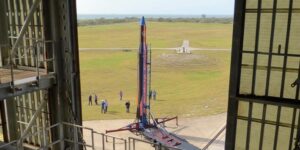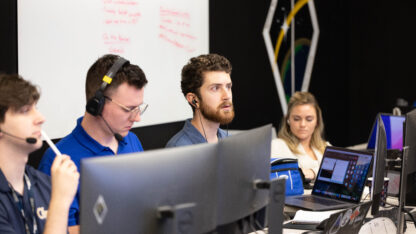Camden fights on to keep county’s spending on fizzled Georgia coast spaceport project from public

It wasn’t long after SpaceX’s Starship launch off the Texas Gulf Coast turned into a fiery spectacle that news of the April 20 explosion reverberated hundreds of miles away to a Georgia community whose leaders had once hoped to have their own launch pad for massive rockets.
When the unmanned rocket burst into flames several minutes after taking off, SpaceX CEO Elon Musk spun the incident as a successful failure for the rocket since it served its purpose as a test site. The explosion prompted the Federal Aviation Administration to investigate why multiple engines failed to ignite in a launch that caused large chunks of concrete to be flung about and sandy debris to fall on a residential neighborhood several miles from the Brownsville, Texas, launch site.
The chatter around Georgia’s Camden County was whether a similar debacle could have occurred near the Little Cumberland Island property where county officials had envisioned building a spaceport where rockets as tall as the 230-foot SpaceX Falcon 9 would be launched into the stratosphere.
The FAA in 2021 would issue an operator’s license for a Spaceport Camden capable of launching smaller rockets, but that plan has been scuttled by a county referendum and lost legal challenges.
On Tuesday, Camden County Commissioner Jim Goodman said he is unsure how repeated claims assuring the safety of launching rockets off Georgia’s coast stack up to the assertion that explosions like SpaceX’s Starship are to be expected.
“One of the things that the proponents, hard-headed as they say, is that well that’s planned. That’s the kind of thing that you expect to happen when rockets are being developed,” Goodman said.
“It’s totally ignoring the fact that county commissioners of that time promised that the possibilities of an incident are minimal, just minuscule,” he added. “There’s a lie in there somewhere. There’s misinformation and thank goodness we don’t have to clean up the environmental disaster.”
In recent weeks, Goodman is among the several people and organizations who oppose the Georgia spaceport to begin receiving a rush of emails, letters, reports, and other files requested under the state’s Open Records Act to gain more insight into the county’s $12 million plans that appear to be sputtering out before the first test rocket is ever launched from an old industrial site.
Goodman has clashed with some of his fellow commissioners since joining the commission in January as he pushed for public disclosure of how $12 million of local taxpayer money has been spent over the years on the project dubbed Spaceport Camden.
In addition, Goodman co-filed a petition that ultimately blocked the spaceport after Camden voters rejected the county’s deal with Union Carbide to purchase property for the spaceport.
The county remains embroiled in a lawsuit against Union Carbide officials after the landowner announced in July that it was no longer extending its option contract agreement to sell the spaceport property to the county.
Goodman declined to comment on pending legal matters involving the spaceport, which has been hampered by several recent setbacks in the county’s attempts to ward off public inspection of records.
“I look forward to when we’re no longer talking about it because it’s not going to happen,” Goodman said. “It was an ill-conceived project. It was not economically viable. The U.S. government has never launched rockets over people’s heads. We need to get past it and concentrate on the things that can bring industry to Camden County, bring real jobs and give a future to the young people.”
Georgia Attorney General Chris Carr’s office also sent a letter in March chastising the county for attempting to withhold emails, letters, and other forms of communication between county officials and spaceport staff. For years, supportive Camden commissioners claimed the records were exempt while a real estate transaction with Union Carbide was pending.
Last week, a Camden County judge ordered county officials to turn over those real estate records that commissioners claimed were exempt from the Georgia Open Records Act.
Along with the real estate records, other files are being withheld based on claimed exemptions related to trade secrets and national security.
“I’m grateful for the information for sure but it is like finding a needle in a haystack,” Desrosiers said. “I’m not even sure that the needle is there because they might claim that the needle is exempt from having to be revealed because of these other exemptions that they’re going to make.”
“Honestly, it wouldn’t be this big of a burden if they had given us the information when we started to ask for it back in 2015,” Desrosiers said. “Now we have to look through eight years of files and that is a huge, cumbersome job.”
The county continues to receive open records requests. This week, the Georgia Recorder requested a copy of a grand jury subpoena as well as the spaceport’s real estate records.
Several subpoenas were issued by the Camden grand jury for records regarding spaceport vendors and the county administration. However, since the subpoenas were issued a month before the jurors’ term ended in April, it would be up to a newly appointed jury to follow up on reviewing the records.
Camden County Chairman Ben Casey has requested for the district attorney and superior court clerk to appoint a special grand jury to investigate the spaceport project.
Special grand juries are capable of probing complex issues over a long period of time, issuing reports, and making recommendations to prosecutors.
And in federal district court in Washington, D.C., One Hundred Miles is asking for a judge to rescind the operator’s license issued for the spaceport by the Federal Aviation Administration. Earlier this year, the Georgia Supreme Court upheld the March 2022 referendum blocking the county from purchasing the barrier island property. There is now only a sliver of hope among a diminishing number of spaceport supporters who want a private company to take on the lead role in building a spaceport.
“I don’t think a spaceport company or a private space company would buy the property given all of the political and legal arguments that have been made throughout the years,” Desrosiers said. “I think if a private spaceport company was interested, they would have revealed themselves years ago and there’s never been one stepping up to the plate.”








